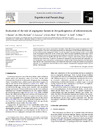Please use this identifier to cite or link to this item:
https://accedacris.ulpgc.es/jspui/handle/10553/54581
| Title: | Evaluation of the role of angiogenic factors in the pathogenesis of schistosomiasis | Authors: | Shariati, F. Pérez-Arellano, J. L. Carranza Rodríguez, Cristina López-Abán, J. Vicente, B. Arefi, M. Muro, A. |
UNESCO Clasification: | 32 Ciencias médicas 320712 Parasitología |
Keywords: | Schistosoma mansoni Schistosomiasis Angiogenesis VEGF Endostatin, et al |
Issue Date: | 2011 | Journal: | Experimental parasitology | Abstract: | Schistosomiasis is one disease produced by helminths, which affect many people in tropical areas. Granuloma formation is the main mechanism involved in the pathogenesis of this disease. Experimental studies have demonstrated angiogenesis (blood vessels formation from pre-existing vessels) in the initial phase of granuloma formation. In the present work, VEGF (vascular endothelial growth factor) levels were analyzed in sera from people diagnosed with different helminthic infections. Patients with schistosomiasis and filariasis had significantly high VEGF levels in compared with healthy people and patients diagnosed with hookworms. In addition, the effects of angiogenesis inhibition using anti-angiogenic factors (endostatin) were evaluated in a schistosomiasis murine model. A lesion decrease was observed in mice infected with Schistosoma mansoni and treated with endostatin. Finally, mechanisms of angiogenesis induction were studied and observed that cercariae antigens stimulated the angiogenic factors by host alveolar macrophages. | URI: | https://accedacris.ulpgc.es/handle/10553/54581 | ISSN: | 0014-4894 | DOI: | 10.1016/j.exppara.2011.01.016 | Source: | Experimental Parasitology [ISSN 0014-4894], v. 128(1), p. 44-49 (Mayo 2011) |
| Appears in Collections: | Artículos |
SCOPUSTM
Citations
26
checked on Jun 8, 2025
WEB OF SCIENCETM
Citations
26
checked on Feb 22, 2026
Page view(s)
43
checked on Jan 10, 2026
Download(s)
11
checked on Jan 10, 2026
Google ScholarTM
Check
Altmetric
Share
Export metadata
Items in accedaCRIS are protected by copyright, with all rights reserved, unless otherwise indicated.
